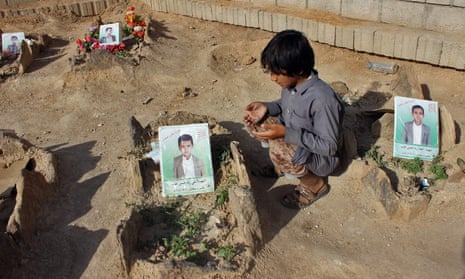The Saudi-led coalition fighting to defeat Houthi rebels in Yemen has again admitted that its bombing campaign may have hit civilians, the second time in a week it has made such a rare admission.
Saudi Arabia is under pressure from the UK and the US both to improve its accuracy and to accept error if internal reviews find civilians have been hit. The Trump administration is required shortly to state if it is wiling to continue to sell arms to Saudi in the light of the repeated air attacks killing civilians.
The Spanish government this week ended arms sales to Saudi Arabia, including 400 laser-guided bombs.
The latest admission of Saudi error focuses on a strike on 23 August that the UN says killed 26 children south of the port of Hodeidah. UN humanitarian operations chief Mark Lowcock said the 26 children and four women killed were in Al-Durayhimi area.
In a statement released by the Saudi Press Agency, coalition spokesman Colonel Turki al-Maliki said: “According to the results of the comprehensive review … there might have been collateral damage and civilian casualties.
“All documents relating to this incident have been handed over to the joint incidents assessment team pending assessment and announcement of results,” he added.
The official spokesman reaffirmed the commitment of the joint forces command of the coalition to apply “the highest standards of targeting, and principles of the international humanitarian law, as well as taking all necessary procedures in case of an incident, God forbid, to achieve the highest levels of responsibility and transparency”.
Last Saturday, the Saudis admitted a bombing raid on 9 August that killed 51 people including 40 children in the rebel-held North was due to mistakes by the Saudi air force.
Alistair Burt, the Middle East minister, on Tuesday described the report by the joint incidents assessment team last weekend as “almost unparalleled in terms of admitting error and pointing out where that error was. I think that the hand of the United Kingdom can be seen in the work that we have done with the coalition over time in order to ensure that should things go wrong, there is proper accountability”.
The rebels, who still control the capital Sana’a and much of the north as well as the Red Sea port city of Hodeidah, accuse the coalition of knowingly targeting children.
The admissions came as the first UN peace talks on Yemen in Geneva since 2016 were stalled due to a refusal of the Houthi delegation to attend the talks until its preconditions are met.
TimelineYemen's civil war
Show
2011 An Arab Spring-inspired uprising forces Yemen’s authoritarian president, Ali Abdullah Saleh, to agree to leave office.
2012 Abdrabbuh Mansur Hadi, previously Saleh’s deputy, takes over as president following an election. He was the only candidate. He struggles to unite the country’s divided political landscape, cope with food insecurity and al-Qaida threats.
2014 Houthi rebels (who belong to the Zaydi sect of Shia Islam) make advances and begin capturing the north of the country, an area they have historically controlled. In September they enter the capital, Sana’a. Hadi flees to Aden.
2015 A renewed rebel offensive forces Hadi to flee to Saudi Arabia, which views the Houthis as an Iranian proxy force. It begins bombing what it says are “military targets” associated with the Houthis and forces loyal to Hadi’s predecessor, Saleh. The Saudi air campaign receives backing from a coalition of Sunni Arab states, as well as logistical support from the US, UK and France.
June 2016 The Saudi-led coalition is included on a UN blacklist of states and groups that violate children’s rights in conflict, reporting it is responsible for 60% of child deaths and injuries. After Riyadh protests, the UN removes it from the list. Human Rights Watch warns of “political manipulation”. At least 6,200 people have been killed, 2.8 million displaced.
October 2016 An airstrike by the Saudi coalition hits a funeral in Sana’a, killing 140. The UN announces a 72-hour ceasefire, which is allegedly broken by both sides.
2017 Devastated by two years of fighting, Yemen is described by the UN as the world’s worst humanitarian crisis. Millions facing famine and the threat of cholera.
November 2017 Saudi Arabia imposes a blockade on Yemen’s ports, following the firing of a missile at Riyadh from rebel-held territory in Yemen. Medicines, vaccines and food are prevented from entering the country. The heads of the World Food Programme, Unicef and the World Health Organisation warn “untold thousands of innocent victims, among them many children, will die”.
Rebecca Ratcliffe
The preconditions include the conditions include the transporting of wounded rebels to Oman, the repatriation of rebels who already received treatment in Oman, and a guarantee that the Houthi delegation will be allowed to return to the rebel-held capital of Sana’a once the talks end.
Martin Griffiths, the UN special envoy for Yemen, had already lowered expectations for the talks saying the two sides were unlikely to meet. But the Yemeni government backed by the Saudis and based in Aden city are also under pressure to negotiate. President Abd Rabbuh Mansour Hadi and his ministers largely operate from Saudi Arabia’s Riyadh, but Aden acts as the de facto capital. Street protests have taken place in the city in recent days over rising prices caused by falls in the currency.
Hadi, due to travel to the US for medical help, was reported to have agreed an increase in public-sector salaries, including for pensioners and contractors.
Hopes that the talks would ease the humanitarian suffering were expressed by Islamic Relief, one of the many charities operating in the country. Naser Haghamed, the charity’s CEO, said: “Guarantees of full and unfettered humanitarian access must be one of the first issues on the table in Geneva, with all sides taking steps to ensure that civilians and aid workers can not only get the supplies they need, but can do so safely.”
